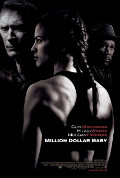
Directed by
Clint Eastwood
122 minutes
Rated M
Reviewed by
Bernard Hemingway

Million Dollar Baby
Synopsis: Maggie Fitzgerald (Hilary Swank) is a 31-year old woman who wants to box professionally. She approaches Frankie Dunn (Clint Eastwood), hoping that he will train her. He refuses but Maggie is relentless and eventually wins over Scrap (Morgan Freeman), Frankie's long-time friend and cohort. After Frankie loses his job managing a potential heavyweight contender he agrees to help Maggie.
There is no shortage of adoring reviews for Million Dollar Baby and so no point in reiterating the unquestionable achievements of Eastwood's latest journey into dark dramatic territory. Acknowledging that this is a finely crafted film by a director who is proving to have a more qualitatively impressive career than his once-lionised maverick contemporaries, Scorsese, Coppola, Friedkin et al., what is there not to like about it?
Essentially, the reservation is that, despite his affinity for the margins Eastwood's artistic sensibility stays well within the conventions and ideology of American mainstream film-making. This means that it is the projection of an ideality rather than the depiction of a reality which is the important creative motivator in his output. In the latter category Karyn Kusama's Girlfight was a lot more winning, albeit not without its own conventionalities.
The sports film, with its against-all-odds, zero-to-hero trajectory is of course a prime example of this cultural value at work. In the sub-genre of the boxing film, Sylvester Stallone and John Avildson gave us the paradigmatic example with Rocky and its cloned sequels. Whilst Eastwood is a far more sophisticated film-maker (as is writer Paul Haggis who has his own impressive CV as director) he either cannot help or feels obliged to leaven his core downbeat story with a sub-plot exemplifying the requisite motivational message, a variant of which we see prominently displayed on the wall of Frank's gym in the early part of the film. When at the virtual end of the film, the focal point of this interpolation, Danger, tells Scrap that despite his definitive pummelling he's going to give his boxing aspirations another shot, this I'm-no-loser cliché mars the emotional coherence of the main story which has been so effectively built by this stage. If it does not destroy that coherence, as Eastwood did so gratuitously with the tacky ending of Mystic River which turned a strong, inventive drama into a neatly-packaged ordinary one, it certainly manages to put our directorial proto-legend on the mat for a while. (That this redemptive message is spoken by a "retard" presumably does not mean that it is to be taken ironically.) Compare Eastwood's film to Robert Wise's discomforting 1949 account of the world of small-time boxing, The Set-Up, or even Elia Kazan's On The Waterfront (1954) and you'll see for yourself how, despite the beguiling effectiveness of its tragic story and elegiac tone, Million Dollar Baby is saturated by the mythos of boxing as the working class's ultimate test of character
Central to this cinematic varnishing is the casting of Hilary Swank in the lead role. Not that she is not commendable and it is of course great to see her tackling the most substantial role she's had since picking up the Best Actress Oscar for Boys Don't Cry. Although she does a fine job with the physicality of the role it is difficult to see why she also picked up the Best Actress Oscar for her work her as it is impossible to believe that her character emerged from the trailer trash gene pool that is so well-depicted. In the transformative stakes Charlize Theron she is not. With her looks wouldn't it have been easier to aim for the catwalk than the canvas? And apropos this, how come no-one hits on her, so to speak, or even seems to notice that she's got a body to raise the dead.Then there's Eastwood's Yeats-reading auto-didact with a taste for theological disputation, Freeman's monastic guardian angel and a parish priest who swears like a sailor.
The American preoccupation with an omnipotent God as arbiter of our lives (note the crucifix prominently displayed around Swank's neck in the latter part of the film) is a significant sub-text in a sophisticated fiction which, although very well done (much credit going to the chiaroscuro cinematography by Tom Stern who also shot Mystic River, at heart shares much with innumerable other Hollywood manipulations such as The Shawshank Redemption (and in which Freeman played a similar narrative function). Eastwood's character whilst being at a material level a failure is at the same time the morally authentic and hence transcendentally superior individual that we have come to know as the American popular hero through films in which few actors have done more to embody it than Eastwood himself. Indeed, Eastwood here is little different in his uber-male fatalism than the character he played in Unforgiven. His token attempts at emotional display seem sorely wrung out of his stiff and leathery carcass.
There is no question that Eastwood is one of the finest mainstream American directors working today, one who is at least is willing to tackle life's complexities before reducing them to comforting platitudes (signified here by "home-made" lemon pie) and this gives his films enough credibility to occupy the twilight zone between art and consumer product. Million Dollar Baby is in this respect a fine example of Eastwood's style and of high-end American film-making. It may indeed be his masterpiece, at least to date, as some critics are clamouring but it is important to note that the personal pronoun is a significant qualifier in that claim.

Want more about this film?


Want something different?




